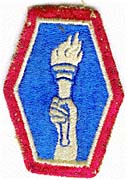

|
In the Military Gregg K. Kakesako |
![]()
Troops cheer
patch resolution
It was "chicken skin" time, one soldier told the Star-Bulletin, when members of the 100th Battalion, 442nd Infantry, were told by their commanding general, Brig. Gen. Joe Chaves, that he had gotten approval for them to wear the shoulder patch whose lineage can be traced to one of the most decorated units in the Army -- the 442nd Regimental Combat Team.
 Chaves, who heads the 29th Brigade, met with soldiers of the 100th Battalion Thursday after being told by the head of the Army, Chief of Staff Gen. Peter Schoomaker, that he would support any decision Chaves would make.
Chaves, who heads the 29th Brigade, met with soldiers of the 100th Battalion Thursday after being told by the head of the Army, Chief of Staff Gen. Peter Schoomaker, that he would support any decision Chaves would make.
"The soldiers spontaneously stood," said a National Guard officer who attended the session. "Their cheers of approval reached roaring levels."
Chaves told the soldiers: "The only thing I ask of you in return is that when I ask you to fight, you fight hard."
The soldiers then spontaneously broke into the 442nd's Regimental song.
It was Shizuya Hayashi, a private in Company A of the 100th Battalion when he earned the Medal of Honor on Nov. 23, 1943, in Italy, who had personally asked Schoomaker to allow the current soldiers of the 100th to retain their current shoulder insignia when they go into combat in Iraq next year.
Acting Army Secretary Les Brownlee met with soldiers of the 1st Cavalry Division and 25th Infantry Division when he visited Baghdad and Kirkuk Air Base on Aug. 27. Brownlee addressed about 200 soldiers of the 25th Infantry Division 2nd Brigade Combat Team in the gym at Kirkuk Air Base.
"I want to tell you how important this mission is that you are performing," Brownlee told the troops from Hawaii. "We are truly at war and we are at war with some of the most murderous, hateful thugs that we've ever faced."
Brownlee then went on to say the mission of the 2nd Brigade Combat Team soldiers from Schofield Barracks is conducting is two-fold -- representing America in a professional manner and defending the people of America.
Lt. Cmdr. Duane Eggert, head of Plans and Operations at Navy Environmental and Preventative Medicine Unit 6 at Pearl Harbor, has been awarded a Bronze Star for his service as an investigator with Team Pox in Iraq. Team Pox, a group of investigators and infantrymen, or "shooters," investigated facilities suspected of housing chemical and biological weapons, and met with and interrogated Iraqi scientists.
The Army's senior neurosurgeon in Iraq has raised questions about the effectiveness of a new combat helmet because it offers less protection on the back and side of the head -- areas most vulnerable to remote-detonated roadside bombs.
The Wall Street Journal recently reported that Lt. Col. Jeff Poffenbarger, the Army's senior neurosurgeon in Iraq, believes that because the new helmet is 8 percent smaller than the old helmet it isn't suitable for guerrilla-type action in Iraq. In infantry-style combat, soldiers are typically hit in the front of the head as they charge the enemy, the paper said. In Iraq, the deadliest threats are roadside bombs, injuring soldiers on the sides and back of the head.
The newspaper said the Marine Corps has decided not to issue the new helmets to many of its troops and is working to develop its own helmet. Poffenbarger's observation is based about 160 head trauma patients who have passed through the 31st Combat Support Hospital where he works. The hospital houses the only American neurosurgeons in Iraq.
The Army said the biggest appeal of the new three-pound helmet -- one pound lighter than the current one -- is that it is made of a stronger Kevlar and can stop a bullet from a 9 mm pistol at close range. The old helmet cannot do that. It cost $300, compared to $100 for the old helmets.
MOVING UP
Hickam Air Force Base:>> Col. Andy Morgan has assumed command of the 15th Mission Support Group.
Pearl Harbor:
>> Cmdr. James Kilby has assumed command of the destroyer USS Russell, relieving Cmdr. William Kearns.
sources by reporter Gregg K. Kakesako, who covers military affairs for
the Honolulu Star-Bulletin. He can be reached can be reached by phone
at 294-4075 or by e-mail at gkakesako@starbulletin.com.